|
|
|
Sort Order |
|
|
|
Items / Page
|
|
|
|
|
|
|
| Srl | Item |
| 1 |
ID:
134088


|
|
|
|
|
| Publication |
2014.
|
| Summary/Abstract |
One reason why Europe went to war in 1914 is that all of the continental great powers judged it a favorable moment for them to fight, and all were more pessimistic about postponing the fight until later. Not only is this historical paradox an interesting puzzle in its own right, but it sheds light on what is arguably the reigning theory of the causes of wars in general: James Fearon's rational bargaining theory. None of Fearon's three main mechanisms-private information, commitment problems, or indivisibility of stakes-can explain the paradox of the universal, simultaneous view of 1914 as a favorable year for war. Two mechanisms that play a marginal role in his analysis, however-bounded rationality in multidimensional power assessments and attempts to mitigate power shifts through coercive diplomacy-help to explain how Europe's powers became trapped in a choice between war now and war later. These mechanisms were set in motion by background strategic assumptions rooted in the culture of militarism and nationalism that perversely structured the options facing Europe's political leaders in 1914. Whereas Fearon's theory assumes that states are paying equal attention to all relevant information, in 1914 each power's strategic calculations produced disproportionate levels of self-absorption in its own domestic concerns and alliance anxieties.
|
|
|
|
|
|
|
|
|
|
|
|
|
|
|
|
| 2 |
ID:
132004
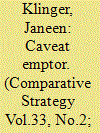

|
|
|
|
|
| Publication |
2014.
|
| Summary/Abstract |
Although intuitively social science has much to contribute to strategy, this article examines the difficulty for strategists doing so. To illustrate the difficulty, the article draws on two social science theories that provided conceptual frameworks for U.S. strategy in the 1960s: deterrence/coercion theory and modernization theory. The article also draws on the cases of Project Camelot in the 1960s and the recent use of human terrain teams to illustrate the difficulty encountered by the military when it tries to use social scientists operationally.
|
|
|
|
|
|
|
|
|
|
|
|
|
|
|
|
| 3 |
ID:
134214
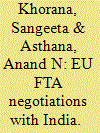

|
|
|
|
|
| Publication |
2014.
|
| Summary/Abstract |
The proposed bilateral free trade agreement (FTA) between India and the European Union has thrown up many contentious issues among which public procurement is an important one. While India is reluctant to include public procurement in FTA, the European Union (EU) has been insisting that FTA without liberalisation of public procurement is not on the negotiating table. What makes India particularly attractive to the EU is not only the size of its public procurement market but also its rapidly growing economy and demand for infrastructure which presents EU firms with an opportunity to gain market access into this sector under the FTA setting. The EU is insisting on national treatment and non-discrimination as also transparency in Indian procurement system. Indian companies aspire to crack open public procurement market in the EU by entering it through the services sector. However, they are finding EU procedures for 'data adequacy' and policies relating to work visa difficult. India's reluctance to negotiate government procurement under the FTA framework is also attributed partly to administrative costs required for making changes to existing framework and for establishing institutions to implement bilateral obligations. Though several deadlines have been missed, an agreement that could bring mutual benefit for both the EU and India is not out of reach.
|
|
|
|
|
|
|
|
|
|
|
|
|
|
|
|
| 4 |
ID:
134213


|
|
|
|
|
| Publication |
2014.
|
| Summary/Abstract |
The paper provides an overview of the most important results of a project on EU-Korea economic and regulatory relations funded by the European Commission. The paper first outlines the emergence and development of EU-Korea relations. In the second part, the paper presents the main findings clustered in three thematic areas. A first thematic area focuses on a discussion of the EU-Korea Free Trade Agreement. The second cluster analyzes EU-Korea cooperation on regulatory policies with a main focus on cooperation in the policy areas of security (arms trade and control), chemical regulation, environmental regulation, education, development cooperation and industrial policy. The third part focuses on EU-Korea cooperation concerning regional and international issues. In the third part, the paper presents the main recommendations which were formulated on the basis of the project
|
|
|
|
|
|
|
|
|
|
|
|
|
|
|
|
| 5 |
ID:
127026
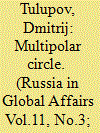

|
|
|
|
|
| Publication |
2013.
|
| Summary/Abstract |
International cooperation in the Arctic has been expanding steadily since the start of the 21st century, assuming systemic outlines over a relatively short period of time (from 2006 till 2013), as evidenced by a series of development concepts approved by the interested countries for their respective regions. The review of these documents indicates that most of the key tasks lie in the foreign policy field, with Arctic diplomacy playing a major role in their implementation. Unique geographical and climatic features make the Arctic truly international. The Arctic Ocean is a center of gravity for polar and off-polar nations. Dividing lines here are less noticeable than on land, but this does not detract from their legal significance. More often than not, resources within the exclusive economic zones of the five littoral states are transboundary in nature and their development (e.g., Shtokman field, Yamal LNG) requires the creation of international consortiums. Apart from cooperation, the Arctic states also have to coordinate their mutual interests and regulate disputes. All these aspects in their entirety form the thematic area within which Arctic diplomacy is used
|
|
|
|
|
|
|
|
|
|
|
|
|
|
|
|
| 6 |
ID:
134215
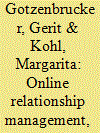

|
|
|
|
|
| Publication |
2014.
|
| Summary/Abstract |
This article introduces a cross-cultural research project involving researchers from Bangkok, Thailand, and Vienna, Austria, and explores the effects of social network services (SNS) on practices of friendship initiation and relationship management among young adults. The focus of inquiry was on differences with regard to the organization of social networks, practices of friendship management, and the mutual interference between media and technology usage and lifestyles. On the basis of explorative interviews and group discussions with young adults living in the two cities studied, we developed a standardized online questionnaire to examine how participation in SNS, such as "Facebook" and "Hi5," has an impact on the meaning of friendship. In addition, we analyzed ego-network structures and their implications for social integration.
|
|
|
|
|
|
|
|
|
|
|
|
|
|
|
|
| 7 |
ID:
133599
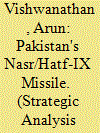

|
|
|
|
|
| Publication |
2014.
|
| Summary/Abstract |
On November 5, 2013 Pakistan conducted its fourth test of the Hatf-IX (Nasr) short range battlefield 'nuclear' missile. To date there have been four flight tests of the missile system. After the first three tests (April 19, 2011, May 29, 2012 and February 11, 2013) Pakistan's Inter Services Public Relations (ISPR) had put out identical press releases.1 These statements claimed that the missile had a range of 60 km and carried 'nuclear warheads (sic) of appropriate yield'. The ISPR statement following the fourth flight test of Nasr, a salvo firing of four missiles, was worded differently and did not repeat the claim that Nasr carried a nuclear warhead. Curiously, it referred to the missile's nuclear capability in a roundabout sort of way. The statement claimed that the missile 'contributes to the full spectrum deterrence against threats in view of evolving scenarios'.2
|
|
|
|
|
|
|
|
|
|
|
|
|
|
|
|
| 8 |
ID:
132257
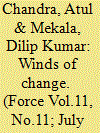

|
|
|
|
|
| Publication |
2014.
|
| Summary/Abstract |
Ensuring that delayed crucial aviation projects are delivered fast should be the new government's priority
Hope is riding high on the new Narendra Modi government. Little over a month after assuming the high office, India's Prime Minister has managed to boost the confidence of the Indian military forces. While symbolic gestures like spending a day aboard INS Vikramaditya helped to bring in motivation to the Indian Navy, which was plagued by series of accidents in the last few months; it is his policy decisions like opening up the defence industry to the private sector that has attracted foreign investors' confidence.
|
|
|
|
|
|
|
|
|
|
|
|
|
|
|
|
|
|
|
|
|